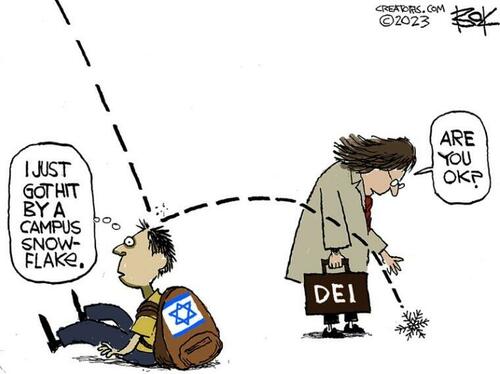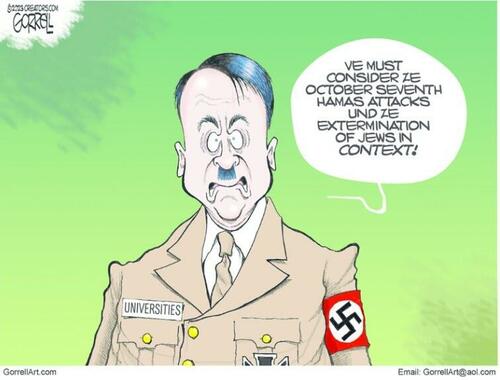“How many lives are 1200 Israelis worth?”
That chilling question was put forward by a Rhode Island history professor last week in a condemnation of Israel as a “white supremacist nation” that prompted the Hamas massacre.
Many donors and parents have been repulsed in recent weeks by such extremist viewpoints on our campuses over the Israel-Gaza war.
For some of us, however, the hostile environment is nothing new on campuses where faculties have been purged of conservative and libertarian voices for years.
Indeed, many of the same figures have previously supported radical, or even violent, efforts directed against conservatives for years. This academic radical chic was long celebrated, not condemned, by the media.
My own campus is not immune from extremist rhetoric.
George Washington University has seen flyers of Hamas hostages ripped down and huge images celebrating the Hamas “martyrs” protected on our buildings.
Most recently, a panel was held at our medical school accusing Israel of “genocide” and describing Hamas as “resistance” fighters against oppression.
This came as Hamas announced that no hostage would be found alive if Israel did not meet its demands.
The day after Hamas made that declaration, Eric Loomis, a history professor and director of graduate studies at University of Rhode Island, wrote a column on the blog Lawyers, Guns, and Money, a far-left site known for extremist rhetoric.
In his column, Loomis declared that, if Israel is not committing genocide, “it is way too close to comfort” to genocidal murder. While condemning Hamas, he said the massacre was “inevitable” and that “if you put people in an open air prison, you basically deserve the attacks you get.” He insisted that “ethnonationalist states can have no place in a liberal world” and “if you can’t agree with this when it concerns Israel, you are racist toward the Palestinians and we can move from there.”
Loomis recognizes that some may be critical of his views but ends by calling them “gigantic flaming a**holes.”
Even after weeks of such rhetoric from faculty, including Cornell University Professor Russell Rickford celebrating the massacre, it is still shocking for many.
It is not shocking to those of us who are part of the dwindling number of dissenting voices on our campuses.
These very same faculty members have been fostered by the media for years. The Washington Post ran Rickford’s views and the New York Times ran those of Loomis. The later relationship is particularly ironic after the Times effectively banned Sen. Cotton for raising the possible need to deploy the national guard to stop violent protests (a measure used on Jan. 6th).
I continue to defend the free speech rights of far-left academics despite my deep disagreement with them. The problem is not their exercise of free speech but the absence of balance or opposing voices on our campuses.
Many are celebrating the retention of Harvard President Claudine Gay as a victory of free speech. Yet, Gay oversees a university ranked dead last in protecting the free speech of others. For the many conservatives and dissenters bullied and silenced at Harvard for years, there may be less cause for celebration that the president is protected. Indeed, liberal faculty members have long enjoyed the full protection of free speech denied to the dwindling number of faculty on right.
Many faculty members have been calling for violent attacks on conservatives and Republicans with little objection from the media or even some universities. Faculty members have freely called for “detonating” people” calling for Republicans to suffer, strangling police officers, celebrating the death of conservatives, calling for the killing of Trump supporters, supporting the murder of conservatives and other outrageous statements.
Conversely, for the few remaining conservatives on most faculties, there is little tolerance for controversy. Dr. Mike Adams, a professor of sociology and criminology, committed suicide after losing his academic position after an inflammatory tweet.
In this academic echo chamber, espousing conservative views is a virtual guarantee of rejection. Imagine being a young conservative professor applying to the University of Rhode Island’s history department where the director of graduate studies has stated that he has no objection to killing conservative protesters.
Other sites like Above the Law have spent years focused on the barring of conservative faculty. Senior Editor Joe Patrice defended “predominantly liberal faculties” by arguing that hiring a conservative professor is akin to allowing a believer in geocentrism to teach at a university.
It is working. A survey conducted by the Harvard Crimson shows that more than three-quarters of Harvard Arts and Sciences and School of Engineering and Applied Sciences faculty respondents identify as “liberal” or “very liberal.” Only 2.5% identified as “conservative,” and only 0.4% as “very conservative.”
The same is true at other schools. A study found that only nine percent of law school professors identify as conservative at the top 50 law schools. A 2017 study found only 15 percent of faculties overall were conservative. Another survey showed that 33 out of 65 departments lacked a single conservative faculty member.
The last few weeks have awakened donors to the rising intolerance and extremism on our faculties. Some donors have even pulled funding, including $100 million withdrawn from the University of Pennsylvania.
Donors (and state legislatures with state-funded schools) can use their leverage to force greater diversity of thought on our campuses. The problem is not that we have these radical faculty members. The problem is that we have comparably few faculty with opposing views. The diversity of opinion on most faculties runs from the left to the far left. Some faculty members now argue that intellectual diversity is not a core or essential value in academia.
If donors want to open up our campuses, they may need to close their wallets until real reforms are implemented in higher education.

